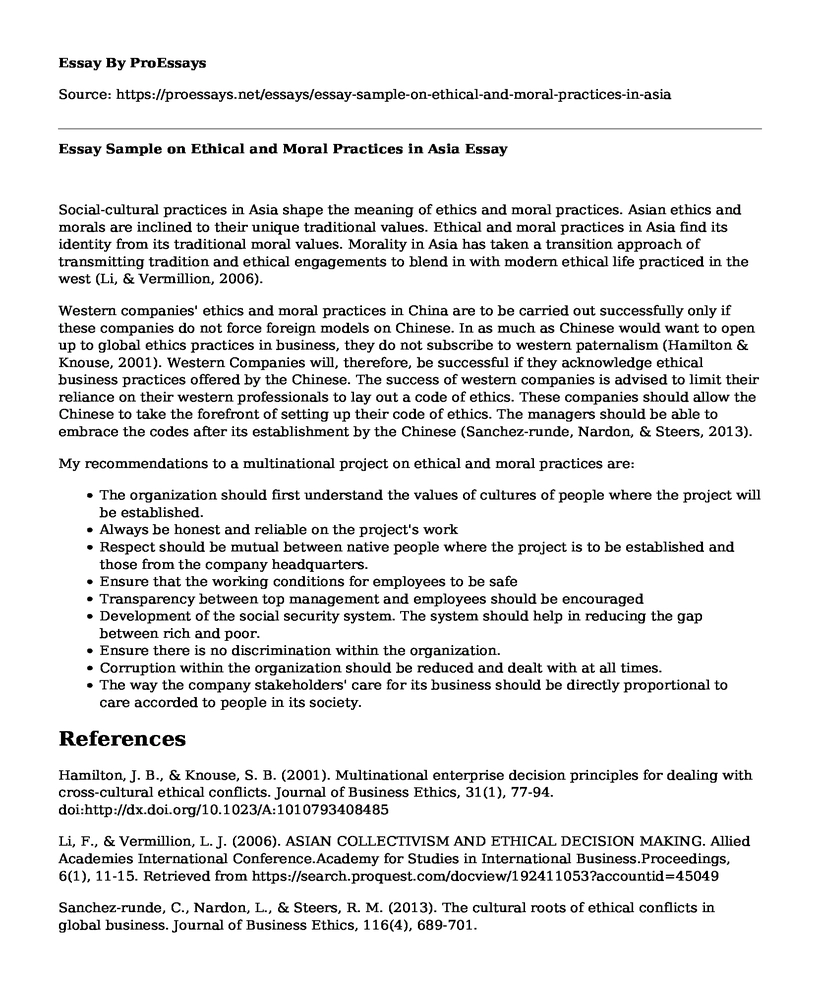Social-cultural practices in Asia shape the meaning of ethics and moral practices. Asian ethics and morals are inclined to their unique traditional values. Ethical and moral practices in Asia find its identity from its traditional moral values. Morality in Asia has taken a transition approach of transmitting tradition and ethical engagements to blend in with modern ethical life practiced in the west (Li, & Vermillion, 2006).
Western companies' ethics and moral practices in China are to be carried out successfully only if these companies do not force foreign models on Chinese. In as much as Chinese would want to open up to global ethics practices in business, they do not subscribe to western paternalism (Hamilton & Knouse, 2001). Western Companies will, therefore, be successful if they acknowledge ethical business practices offered by the Chinese. The success of western companies is advised to limit their reliance on their western professionals to lay out a code of ethics. These companies should allow the Chinese to take the forefront of setting up their code of ethics. The managers should be able to embrace the codes after its establishment by the Chinese (Sanchez-runde, Nardon, & Steers, 2013).
My recommendations to a multinational project on ethical and moral practices are:
- The organization should first understand the values of cultures of people where the project will be established.
- Always be honest and reliable on the project's work
- Respect should be mutual between native people where the project is to be established and those from the company headquarters.
- Ensure that the working conditions for employees to be safe
- Transparency between top management and employees should be encouraged
- Development of the social security system. The system should help in reducing the gap between rich and poor.
- Ensure there is no discrimination within the organization.
- Corruption within the organization should be reduced and dealt with at all times.
- The way the company stakeholders' care for its business should be directly proportional to care accorded to people in its society.
References
Hamilton, J. B., & Knouse, S. B. (2001). Multinational enterprise decision principles for dealing with cross-cultural ethical conflicts. Journal of Business Ethics, 31(1), 77-94. doi:http://dx.doi.org/10.1023/A:1010793408485
Li, F., & Vermillion, L. J. (2006). ASIAN COLLECTIVISM AND ETHICAL DECISION MAKING. Allied Academies International Conference.Academy for Studies in International Business.Proceedings, 6(1), 11-15. Retrieved from https://search.proquest.com/docview/192411053?accountid=45049
Sanchez-runde, C., Nardon, L., & Steers, R. M. (2013). The cultural roots of ethical conflicts in global business. Journal of Business Ethics, 116(4), 689-701. doi:http://dx.doi.org/10.1007/s10551-013-1815-y
Cite this page
Essay Sample on Ethical and Moral Practices in Asia. (2022, Dec 16). Retrieved from https://proessays.net/essays/essay-sample-on-ethical-and-moral-practices-in-asia
If you are the original author of this essay and no longer wish to have it published on the ProEssays website, please click below to request its removal:
- Arguments in Favor of Objectivism and Subjectivism Essay
- Ethical Case: Provisions on Accepting Gifts
- Paper Example on Freedom and Determinism
- Research Paper Action Plan Code of Ethics of the Elementary School
- How People Judge Others by How They Speak or Write
- Socrates: Father of Western Philosophy & The Socratic Method - Essay Sample
- Essay Sample on Codes of Ethics: Accuracy, Consent, Diversity & Professionalism







